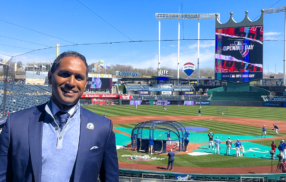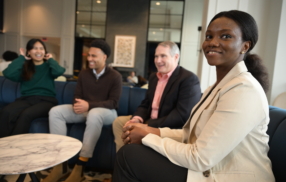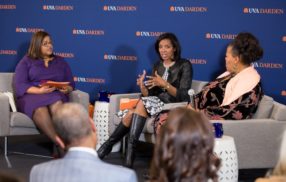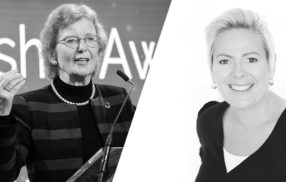Former Surgeon General Eases Fears on J&J Vaccine Pause, Emphasizes Importance of Community Health to Economic Prosperity at UVA Darden Event
By Jay Hodgkins
Dr. Jerome Adams, the 20th Surgeon General of the United States and a Dean’s D.C. Fellow at the University of Virginia Darden School of Business, planned to speak with Professor Greg Fairchild about the links between community health and economic prosperity at Darden’s Leadership Unscripted speaker series event 13 April. But as the name of the event suggests, Adams chose to quickly go off script to address growing fear and confusion over the U.S. government’s decision to pause administration of Johnson & Johnson’s COVID-19 vaccine.
“The pause on the Johnson & Johnson vaccine is about looking at a potential complication we’re seeing with six women, out of 7 million vaccinations, who had potentially dangerous blood clots. We take an oath to do no harm, so in that vein, we took a pause to look at the data,” Adams told the event audience hours before his op-ed on the decision to pause the vaccine was published in The Washington Post. “The (U.S. Food and Drug Administration) has a process to continue following people to look for complications, so people should be assured the process is working as it should.”
The public should expect the government to soon announce that the J&J vaccine is highly safe or that, perhaps, certain populations should avoid receiving it, Adams predicted.
Adams reminded the audience that the Pfizer and Moderna vaccines use a completely different biotechnology and have been given to many more people than the J&J vaccine without any issues with blood clots. He encouraged everyone to continue to get these “highly safe and effective” vaccines, and commended the vaccine rollout in the U.S., where 46 percent of adults had received at least one dose as of mid-April.
For those skeptical of receiving a COVID-19 vaccine, Adams invited them to consider the many risks related to people’s physical and mental health, the economy, and children if Americans fail to quash the pandemic and schools and businesses are not able to fully reopen. He argued those risks to individuals far outweigh the risk of vaccination.
Uniting Business, Public Health Sectors on Community Health and Economic Prosperity
Adams and Fairchild did pivot back to their intended topic of discussion, eventually: the many links between community health and economic prosperity, and what the private and public health sectors can do to work with each other more effectively to advance their common interests.
It was a fitting topic for the two. Fairchild was a key contributor to Community Health and Economic Prosperity: Engaging Businesses as Stewards and Stakeholders, the first report from the Office of the Surgeon General focused on community health and economic prosperity.
Fairchild asked why, among the many public health issues Adams could have chosen to prioritize, he chose that one.
“I’ve continually seen public health pitted against business. And when that happens, public health loses,” Adams answered. “Whether it’s climate or firearm safety or drug policy, we need to figure out how we can speak the same language.”
He offered the example of a time he attended a conference of mayors on the topic of walkable communities. From Adams’ perspective as a physician, walkable communities are a highly successful public intervention to lower hemoglobin A1c and fight diabetes in the community. However, when Adams asked the mayors if any of them made their push for more walkable communities based on the benefits of lowering hemoglobin A1c they, predictably, said “no.” They said they pursued walkable communities for economic ends, such as more people coming to areas of commerce to shop or to increase property values.
“We both cared about this intervention, but for different reasons,” Adams said. “So this report is like the Rosetta Stone to help these two sides communicate with each other.”
In the past, Adams said, leaders in public health and business have eyed each other skeptically. However, their interests are actually aligned in many cases.
“The U.S. health disadvantage to other countries costs businesses in terms of productivity, insurance costs … and we can’t buy our way out of it by spending on the downstream side of health care,” Adams said. “We’re trying to make the case to businesses that there are many reasons and opportunities to play a role in the health of their employees, consumers and communities, and that will pay them back in terms of profit.”
Both men discussed personal experiences with health disadvantages brought on by uneven access to care due to factors such as race, gender, geographic location and income. Fairchild said his mother lacked access to adequate diabetes care because there was no diabetes clinic anywhere near her home in Southwest Virginia. When Fairchild was able to get his mother care at UVA Health, it was a life-saving outcome. Adams shared the challenge his family faced trying to find treatment for his brother’s drug-use disorder during the pandemic because so many treatment centers shut down.
Adams said 80 percent of health is determined by what happens outside of a doctor’s office, such as the quality of social and physical environments and individual behaviors, which are themselves often driven by environmental cues. The opportunities for business lay in how they can improve conditions for their communities in that 80 percent.
Fairchild held up the examples of two Batesville, Indiana-based companies he examined in a new case study as exemplars of supporting community health. Hillenbrand and its subsidiary Batesville Casket Company, Fairchild said, invested heavily in education, smoking cessation and many other areas that lead to lower costs over the long term. Fairchild argued that businesses should think of such programs as investments with ROI, rather than philanthropy.
Public Servants ‘Can’t Afford to Take Four Years Off’
The conversation also addressed the toxic, partisan environment affecting government in recent years, and Adams shared his personal story of how certain family members and friends asked him how he could accept — and even implored him not to take — former President Donald Trump’s nomination to become Surgeon General in 2017.
“There are tens of thousands of public servants keeping our roads paved, our hospitals open, putting out fires. We need those people there, even if and especially when you don’t like the leadership in charge,” Adams said. “I encourage you to think about that and support public servants at a time when they are under unprecedented attack. We can’t afford to take four years off because we don’t like a governor or president.”
The University of Virginia Darden School of Business prepares responsible global leaders through unparalleled transformational learning experiences. Darden’s graduate degree programs (MBA, MSBA and Ph.D.) and Executive Education & Lifelong Learning programs offered by the Darden School Foundation set the stage for a lifetime of career advancement and impact. Darden’s top-ranked faculty, renowned for teaching excellence, inspires and shapes modern business leadership worldwide through research, thought leadership and business publishing. Darden has Grounds in Charlottesville, Virginia, and the Washington, D.C., area and a global community that includes 18,000 alumni in 90 countries. Darden was established in 1955 at the University of Virginia, a top public university founded by Thomas Jefferson in 1819 in Charlottesville, Virginia.
Press Contact
Molly Mitchell
Senior Associate Director, Editorial and Media Relations
Darden School of Business
University of Virginia
MitchellM@darden.virginia.edu







